Home » Ovarian Cyst Surgery in Chennai: Purpose, procedure, risks and recovery
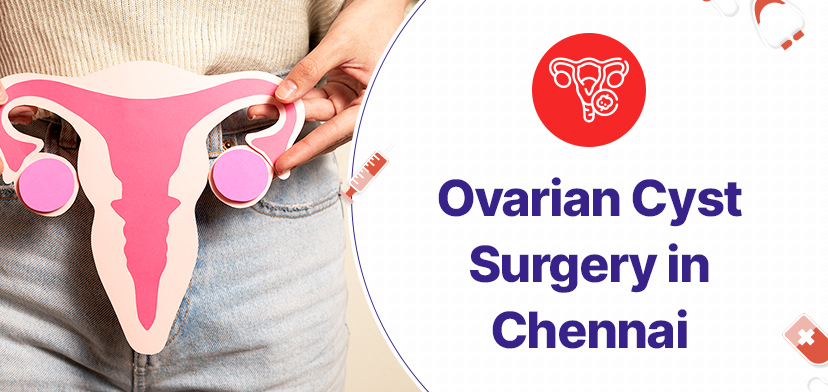
Surgery can make people feel anxious or overwhelmed, especially if they have ovarian cysts. The right diagnosis and course of care, including ovarian cyst removal surgery, can result in genuine relief and comfort.
But how precisely does laparoscopic surgery for ovarian cysts work? In this article, we will go over every step of the procedure, from diagnosis to cost to healing. We’ll discuss what to anticipate, how to be ready for surgery, the cost in Chennai, as well as how to recover.
Making this process as simple and efficient as we can is our ultimate goal. Remember, you are not alone in these difficult times. There are treatments available to assist you. Find the finest gynaecologist for ovarian cyst, get a diagnosis, and take the required action to get relief.
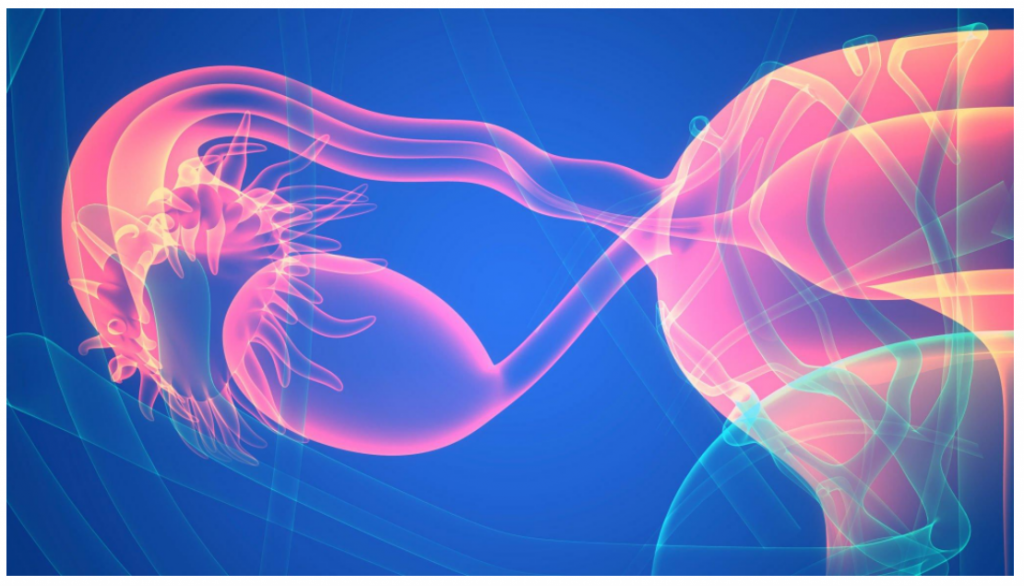
A fluid-filled sac known as an ovarian cyst can form inside or on the outside of a female’s ovary. They often develop during ovulation, when the follicle collapses and the egg is expelled. Yet, if the follicle does not collapse and instead starts developing or if the egg is not released, some cysts may form. Ovarian cysts can range in size from little to enormous, and they might present with symptoms like discomfort, bloating, and irregular menstruation.
Ovarian cysts can be brought on by genetics, endometriosis, polycystic ovary syndrome (PCOS), uterine fibroids, and other underlying medical conditions.
In addition, lifestyle factors such as obesity or a lack of exercise may cause some women to develop ovarian cysts.
Birth control medications, pelvic infections, hormone imbalances, and tumours are all potential causes of cysts. Some cysts can also develop from tissue that was left over from prior surgery.
It’s crucial to realise that many ovarian cysts are harmless and will disappear on their own. Surgery is only conducted if the cyst is big or causing discomfort or other symptoms.
Even while the majority of ovarian cysts disappear on their own, unresolved or untreated cysts can cause discomfort and pain. The following are the most typical signs of an ovarian cyst:
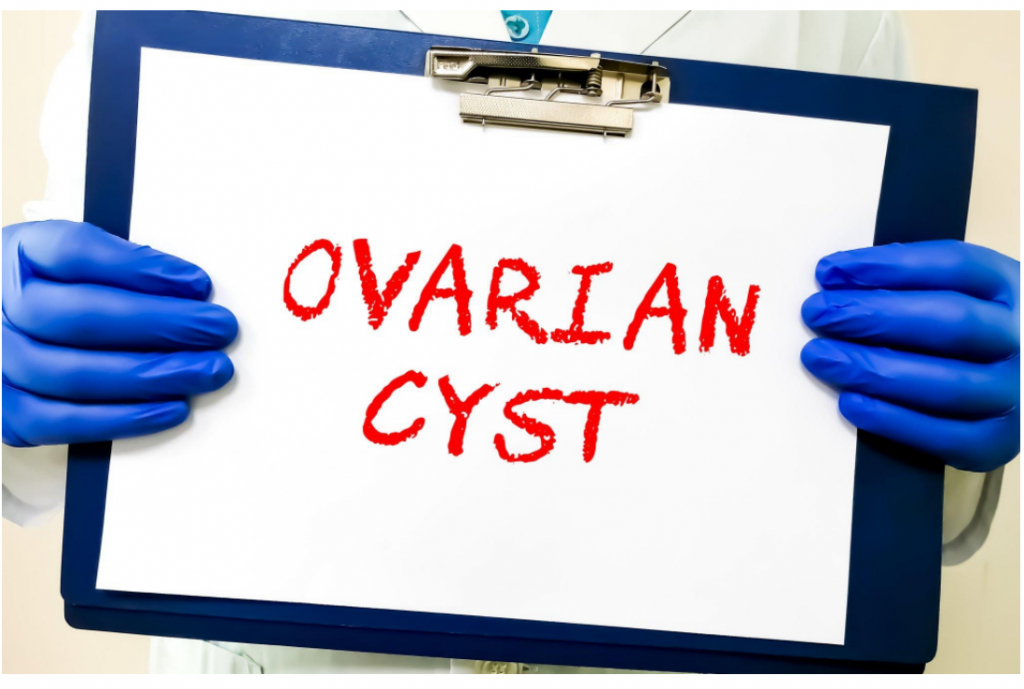
A physical examination, pregnancy test, blood work (tumour marker tests), ultrasound, or laparoscopy can all be used to find ovarian cysts.
Ultrasound of the pelvic region
The doctor needs to use this technique in order to identify your cyst and recommend a course of therapy. Moreover, ultrasound can be used to track the cyst’s growth and check for changes. There is no downtime necessary, it is painless, and it is non-invasive. It is a trustworthy method for tracking ovarian cysts and figuring out whether surgery is required.
Laparoscopy
The doctor will make a tiny incision in your abdomen and insert a laparoscope to examine the cyst. The doctor may choose to remove the cyst or leave it alone depending on its size and shape. If the cyst is removed, the cyst and surrounding tissue will be checked for indications of cancer or other illnesses before being sent to a lab for additional testing. The doctor might also have to remove nearby lymph nodes or tissue to make sure there aren’t any cancerous cells present.
Examination of the blood
Cancer antigens are proteins that are searched for during tumour marker testing.. A cancer antigen 125 (CA 125) test or other relevant blood tests may be carried out if the cyst seems to be solid and the patient has a high risk of developing ovarian cancer. Many cancers and non-cancerous disorders can cause an increase in CA 125 levels. They are not diagnostic in and of themselves as a result. There may be a need for a CT scan or an MRI to confirm the diagnosis.
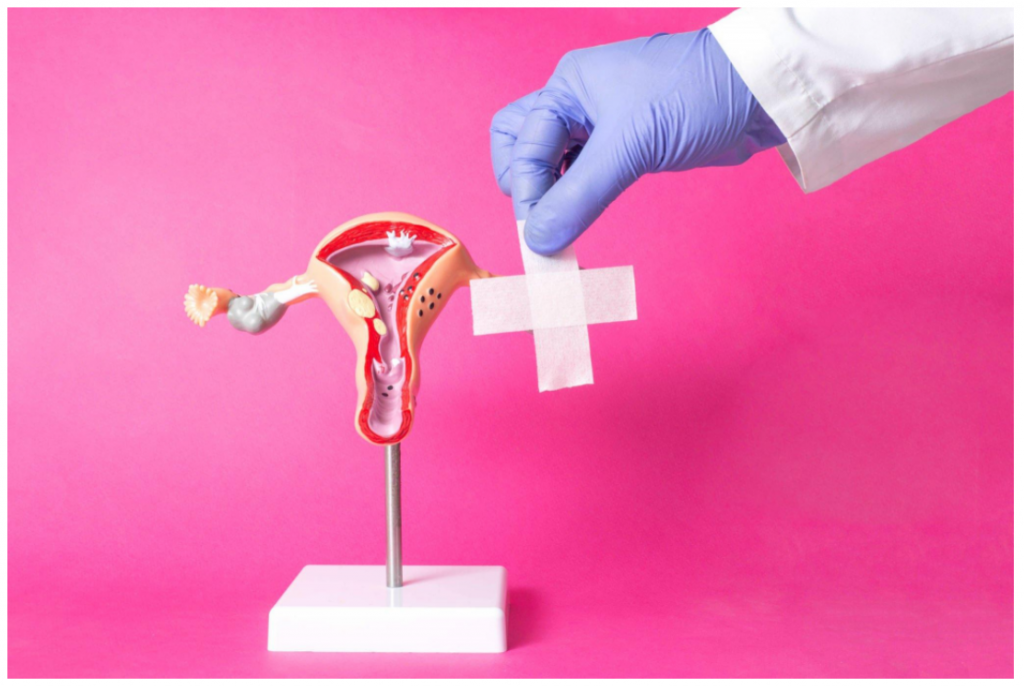
There are a number of signs that you should have ovarian cysts removed, including:
You should be prepared before having surgery to remove an ovarian cyst. This entails having a thorough physical and conversing with your doctor about the operation’s advantages and disadvantages. Also, it’s critical to be ready for any potential difficulties following surgery.
Moreover, make sure you adhere to the doctor’s pre-operative test and treatment recommendations and are in physical condition for surgery. Also, it is essential to make plans for post-operative care, which includes getting the required medicines, planning transportation, and setting up a relaxing recovery space.
Furthermore, it’s critical to plan ahead for payment of the treatment and discuss with your doctor the costs of ovarian cyst surgery.
Large or unusual-looking ovarian cysts are commonly advised to undergo surgery. Surgery may be advised if cysts cause discomfort or other symptoms or if the patient is at risk of developing ovarian cancer. Laparoscopic cystectomy and laparotomy are the two main procedures used to treat ovarian cysts.
Laparoscopy Cystectomy
The surgeon will make a few small incisions in the belly during the surgery and introduce a laparoscope to examine the interior. Less intrusive on the body than open surgery, laparoscopy is a minimally invasive surgical method. Cysts, tissue, or lymph nodes are commonly removed using this method. In most cases, recovery takes less time than with open surgery, and scarring is barely noticeable.
Cystectomy Laparotomy
This procedure is frequently used when the cyst is large or when the doctor wants to extract nearby lymph nodes or tissue to check for the presence of malignant cells. A single incision is made in the lower belly during a laparotomy, a more invasive type of surgery. Recovery time is longer than with laparoscopy, and the surgery can leave a scar. To make sure the cyst doesn’t come back after surgery, you must speak with your doctor.
Depending on the nature and complexity of the surgery, varying amounts of time will be essential for recovering. Following treatment, you are typically advised to take it easy for a few days and refrain from too many activities until your doctor gives the all-clear. In case it is required, painkillers will be given. It’s critical to adhere to all of the doctor’s recommendations for a successful recovery.
After surgery, you should change their diet and exercise regimen. For a quick recovery, a balanced diet rich in fruits and vegetables is essential.
Your physician might advise you to regularly go for walks or participate in other low-impact exercises, gradually stepping up the intensity as you regain strength and stamina. Even though some discomfort could last for a while, it’s critical to adhere to all of the doctor’s recommendations in order to get the greatest results.
Like any surgical procedure, ovarian cyst surgery has risks and potential drawbacks. Infection, internal bleeding, and organ damage are all possible side effects.
Prior to having surgery, it is critical to be informed of the risks and to discuss them with the surgeon. Regular follow-up visits are required to check for recurrence of the cyst because it can occasionally return.

The procedure and the hospital where it is performed affect the Ovarian cyst surgery cost in Chennai . Because it is a more complicated and less invasive surgery, a laparoscopic cystectomy is frequently more expensive than a laparotomy. Ovarian cyst surgery cost in Chennai normally range from 20,000 to 3,00,000 rupees.
Ovarian Cyst Surgery Cost different cities
City
Price Range (Min-Max)
Bangalore
Rs. 50000 – Rs. 1,00,000
Chandigarh
Rs. 65000 – 90,000
Chennai
Rs. 20,000 – 3,00,000
Hyderabad
Rs. 40,000 – 2,00,000
Indore
Rs. 65000 – 90000
Kolkata
Rs. 65000 – 1,00,000
Lucknow
Rs. 65000 – 90000
Mumbai
Rs. 20,000 – 2,50,000
Noida
Rs. 50,000 – 2,50,000
Patna
Rs. 65000 – 90000
Pune
Rs. 20,000 – 3,00,000
In addition to the cost of the operation, other expenses including those for medications, diagnostics, and follow-up visits may be taken into account.
Also, patients should be made aware that some doctors may require extra pre- and post-operative testing or treatments. Before making a choice, it is critical to comprehend the potential costs associated with ovarian cyst laparoscopic surgery in Chennai.
For patients who need a loan for ovarian cyst removal, GMoney can offer help with flexible payback terms, free medical EMI, and no collateral.
Patients can have faith that GMoney would cover their medical expenses and enable them to get the finest treatment for their issues without stressing out too much about the cost of the surgery. They have collaborations with top hospitals in Chennai, that have the best gynaecologist for ovarian cyst in Chennai.
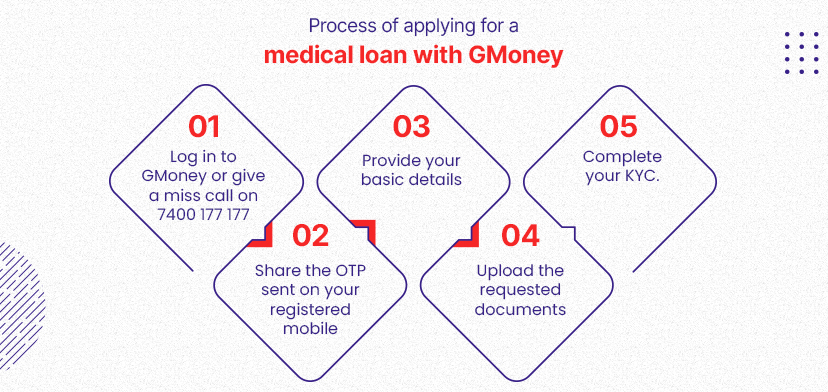
1. What exactly is ovarian cyst surgery?
Ovarian cyst surgery is a procedure for removing an ovarian cyst. The cyst could be benign or malignant, and surgery could include removing the entire ovary or only the cyst. The goal of the procedure is to remove the cyst while conserving as much of the ovary as possible.
2. What is the ovarian cyst surgery procedure?
Laparoscopic ovarian cyst surgery often entails making small incisions in the abdomen and inserting a camera and equipment through them. The surgeon will then find and remove the cyst. In some circumstances, larger cysts or cysts located deep in the abdomen may demand open abdominal surgery.
3. What are the risks with ovarian cyst surgery?
Ovarian cyst surgery, like any other surgical procedure, has risks. Infection, haemorrhage, organ damage, and blood clots are examples of complications. Furthermore, if the cysts are not completely removed, they may return.
4. What may I expect after ovarian cyst surgery?
Following ovarian cyst surgery, you may experience abdominal pain and discomfort. You may also experience nausea and exhaustion. It is crucial to follow your doctor’s recovery advice, which may include taking pain medicines and avoiding strenuous exercise.
5. How much does ovarian cyst surgery cost in Chennai?
The cost of ovarian cyst surgery varies depending on your treatments, intricacy, hospital of choice, and other factors. In general, it can range from Rs. 25,000 up to 3,00,000, depending on the treatment’s complexity and other factors.
6. How long does it take to recover from ovarian cyst surgery?
The recovery period after ovarian cyst surgery may vary depending on the procedure and other factors. In general, most patients should be able to resume normal activities within a few weeks of treatment.
7. How long is the GMoney no-cost EMI for ovarian cyst surgery?
GMoney offers a variable payback time, allowing consumers to choose a loan period ranging from three to eighteen months based on their ability to pay.
8. What documents are needed to apply for no-cost EMI?
You must submit the following documents online: Aadhar Card, Pan Card, and Bank Statement for the Previous Three Months
Surgery to remove ovarian cysts is a frequent operation with a low risk of complications. It is critical to comprehend the risks, potential costs, and possible financing choices associated with the surgery. GMoney is an excellent option for people who need to pay for ovarian cyst surgery because it provides quick and simple loan approval with flexible payback periods. Ovarian cyst surgery can be a successful and secure treatment if carried out correctly.
Disclaimer: THIS WEBSITE DOES NOT PROVIDE MEDICAL ADVICE.
Follow us
Reach us
Mumbai HO
GMoney Pvt. Ltd.
315, 215 Atrium,
Next to Courtyard by Marriott,,
A.K. Road, Andheri East,
Mumbai - 400093
Ph : +91 86570 00105, +91 72089 60444
Quick Links
Bengaluru
GMoney Technologies Pvt. Ltd.
Oyo Work Spaces, Umiya Emporium,
Opposite Forum Mall, Hosur Rd,
Koramangala, Bengaluru,
Karnataka 560029
Ph : +91 89717 34815
Delhi
GMoney Technologies Pvt. Ltd.
Berry Co Works, 1E/3,
Jhandewalan extension,
Next to jhandewalan metro station
gate no. 2 Barakhambha Road,
New Delhi, Delhi 110001
Ph : +91 97116 26832
Pune
GMoney Technologies Pvt. Ltd.
91 Spring Board, Sky Loft,
Creaticity Mall, Off, Airport Rd,
opposite Golf Course, Shastrinagar,
Yerawada, Pune,
Maharashtra 411006
Ph : +91 84250 28758
Chandigarh
GMoney Technologies Pvt. Ltd.
SCO no. 292,
First Floor, Sector 35D,
Chandigarh
Ph : +91 84279 82012
Jaipur
GMoney Pvt. Ltd.
CODESKK Civil Tower,121 122,
Pandit TN Mishra Marg,
Santhosh Nagar, Nirman Nagar,
Jaipur – 302019
Ahmedabad
GMoney Pvt. Ltd.
22nd Floor, B Block,
Westgate By True Value,
Nr. YMCA Club, SG Highway,
Ahmedabad – 380051
Hyderabad
GMoney Pvt. Ltd.
Dwaraka Pride,
Plot no. 4/1, Survey No. 64,
Huda Techno Enclave, Madhapur,
Hyderabad (Telangana) – 500081
Chennai
GMoney Pvt. Ltd.
DBS Business Center, 31A,
Cathedral Garden Rd, Badrikari, Tirumurthy Nagar, Nungambakkam, Chennai, Tamil
Nadu – 600 034
Mumbai HO
GMoney Pvt. Ltd.
315, 215 Atrium,
Next to Courtyard by Marriott,,
A.K. Road, Andheri East,
Mumbai - 400093
Ph : +91 86570 00105, +91 72089 60444
Bengaluru
GMoney Pvt. Ltd.
3rd floor, Ranka Junction,
AH45, Krishna Reddy Industrial Estate,
Dooravani Nagar,
Bengaluru Karnataka - 560016
Ph : +91 72089 60444
Pune
GMoney Pvt. Ltd.
91 Spring Board, Sky Loft,
Creaticity Mall, Airport Rd,
Opp. Golf Course, Shastrinagar,
Yerawada, Pune,
Maharashtra - 411006
Ph : +91 72089 60444
Delhi
GMoney Pvt. Ltd.
Berry Co Works, 1E/3,
Jhandewalan extension,
Gate no. 2 Barakhambha Road,
New Delhi, Delhi - 110001
Ph :
+91 72089 60444
Chandigarh
GMoney Pvt. Ltd.
SCO No. 292,
First Floor, Sector 35D,
Chandigarh - 160022
Ph : +91 72089 60444
Hyderabad
GMoney Pvt. Ltd.
Dwaraka Pride,
Plot no. 4/1, Survey No. 64,
Huda Techno Enclave, Madhapur,
Hyderabad (Telangana) - 500081
Jaipur
GMoney Pvt. Ltd.
CODESKK Civil Tower,121 122,
Pandit TN Mishra Marg,
Santhosh Nagar, Nirman Nagar,
Jaipur - 302019
Chennai
GMoney Pvt. Ltd.
DBS Business Center, 31A,
Cathedral Garden Rd, Badrikari,
Tirumurthy Nagar,Nungambakkam, Chennai,
Tamil
Nadu - 600 034
Pune | Mumbai | New Delhi | Kolkata | Chennai | Navi Mumbai| Bengaluru | Ahmedabad | Nagpur | Hyderabad | Jaipur | Lucknow | Bhopal | Bhubaneswar | Nashik | Indore | Ghaziabad | Kanpur | Amritsar | Vasai | Noida | Gurugram | Chandigarh | Ranchi | Cuttack | Thane | Kalyan | Jalandhar | Kolhapur | Visakhapatnam | Chakan| Greater Noida | Wagholi | Raipur | Panvel | Belgaum | Mohali | Bhiwandi | Talegaon | Coimbatore | Palghar | Mumbra | Sangli | Surat | Durgapur | Ludhiana | Kochi | Agra | Ahmednagar | Ajmer | Akola | Aurangabad | Baroda | Beed | Rewari | Patiala | Vellore | Ranjangaon | Nanded | Nellore | Panipat | Panjim | Madurai | Mysore | Mangalore | Korba | Mathura | Kalaburagi | Jalgaon | Kharar | Guwahati | Kollam | Jamshedpur | Gwalior | Saswad | Solapur | Varanasi | Salem | Sambalpur | Jodhpur | Hubli | Panchkula | Faridabad | Amravati | Ayodhya | Badlapur | Dehradun | Parbhani | Ujjain | Udaipur | Tiruchirappalli | Srinagar | Shimla | Secunderabad | Ratnagiri | Pandharpur | Ananthapuram | Buldhana | Hadapsar | Baramati | Chittoor | Darjeeling | Dhule | Fatehpur | Gandhinagar | Haridwar | Gorakhpur | Jhansi | Kanchipuram | Kartarpur | Kurukshetra | Pondicherry | Prayagraj | Bharuch | Bhusawal | Bathinda | Pathankot | Nandurbar | Niphad | Kolar | Ambala | Kota | Pendurthi | Jabalpur | Palwal | Bhilai | Bhiwani | Bilaspur | Patna | Rohtak | Phagwara | Malegaon | Vijayawada | Bikaner | Chiplun | Darbhanga | Roorkee | Bhor | Rajahmundry | Margao | Alwar | Dhanbad | Bulandshahr | Aluva | Mulshi | Davanagere | Kapurthala | Anantapur | Loni | Latur | Gondia | Chhindwara | Chandrapur | Dharmapuri-TN | Faridkot | Dharwad | Daund | Chaksu | Bareilly | Kakinada | Haldwani | Doddaballapur | Dindori-MH | Bagru | Kudus | Kozhikode | Gurdaspur | Bokaro | Berhampur | Batala | Barrackpore | Ramgarh | Meerut | Bassi | Dera Bassi | Howrah | Karjat Raigarh | Thiruvananthapuram | Bheemunipatnam | Ambegoan | Allahabad | Aligarh | Alappuzha | Tirupathi | Thoppumpady | Srikakulam | Siliguri | Rourkela | Mirzapur | Gadag | Bellary | Tumkur | Sonipat | Hoshangabad | Junnar | Jalna | Hisar | Karnal | Kottayam | Muzzafarnagar | Ramnagara | Thrissur | Bahadurgarh | Balasore | Baraut | Dhar | Ernakulam | Gadhinglaj | Chikodi | Vaniyambadi | Kamothe |